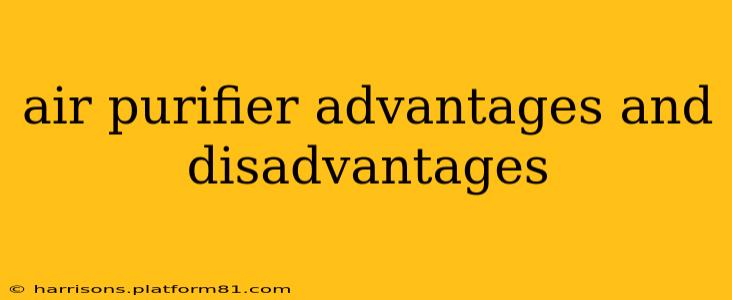Air purifiers have become increasingly popular in homes and offices worldwide, promising cleaner, healthier air. But are they all they're cracked up to be? This comprehensive guide delves into the significant advantages and disadvantages of using an air purifier, helping you decide if one is right for your needs.
Advantages of Using an Air Purifier
Air purifiers offer a multitude of benefits, significantly impacting indoor air quality and overall health. Let's explore some key advantages:
Improved Air Quality: This is the most significant advantage. Air purifiers effectively remove various pollutants from the air, including dust, pollen, pet dander, mold spores, smoke, and volatile organic compounds (VOCs). This leads to a cleaner, fresher breathing environment, especially beneficial for those with allergies or respiratory sensitivities.
Reduced Allergy and Asthma Symptoms: For individuals suffering from allergies or asthma, an air purifier can dramatically reduce the severity and frequency of symptoms. By filtering out airborne allergens, they minimize triggers and improve breathing comfort.
Better Sleep Quality: Clean air contributes to better sleep. Removing irritants like dust mites and pollutants allows for more restful and restorative sleep.
Protection Against Harmful Pollutants: Air purifiers offer protection against harmful pollutants that can negatively impact respiratory health. This is particularly important in areas with high levels of air pollution, such as those near busy roads or industrial areas.
Elimination of Odors: Many air purifiers are equipped with activated carbon filters that effectively absorb odors from pets, cooking, and other sources, leaving your home smelling fresher.
Improved Mood and Concentration: Breathing clean, fresh air can positively impact mood and cognitive function, potentially leading to improved concentration and productivity.
Disadvantages of Using an Air Purifier
While air purifiers offer numerous advantages, it's crucial to consider the potential drawbacks:
Cost: Air purifiers range in price from budget-friendly models to high-end units with advanced features. The initial cost, as well as ongoing filter replacement costs, can be significant.
Noise: Some air purifiers can be noisy, particularly those with powerful fans. The noise level can be disruptive, especially during nighttime. Consider the decibel rating before purchasing.
Maintenance: Air purifiers require regular maintenance, including filter replacements. Failing to maintain your air purifier can reduce its effectiveness and potentially shorten its lifespan.
Space Requirements: Air purifiers occupy space, and larger models can take up a considerable amount of floor space. Consider the size of your room and the purifier's dimensions before purchasing.
Ozone Emission (Some Models): Some older or lower-quality air purifiers may emit ozone, a harmful pollutant. Look for models certified to meet safety standards and avoid those that generate ozone.
Electricity Consumption: Air purifiers consume electricity, adding to your energy bill. While the energy consumption is typically low, it's a factor to consider.
What is the best air purifier for allergies?
The best air purifier for allergies will depend on your specific needs and the size of the room. Look for models with HEPA filters, which are highly effective at removing allergens like pollen and dust mites. Consider the Clean Air Delivery Rate (CADR) rating, which indicates how effectively the purifier cleans the air. A higher CADR rating means faster air purification.
How often should I change my air purifier filter?
The frequency of filter changes varies depending on the type of filter, the usage intensity, and the air quality in your home. Most manufacturers recommend filter changes every 3-6 months, but you should check your user manual for specific recommendations. You might need more frequent changes if you live in an area with high air pollution or if you have pets.
Are air purifiers worth it?
Whether an air purifier is worth it depends on your individual circumstances. If you suffer from allergies, asthma, or other respiratory conditions, or if you live in an area with poor air quality, an air purifier can significantly improve your health and well-being. However, consider the cost and maintenance requirements before making a purchase. Weigh the advantages against the disadvantages to determine if an air purifier is the right choice for you.
This detailed analysis provides a balanced perspective on air purifiers, enabling informed decision-making. Remember to research different models and choose one that best suits your specific needs and budget.
